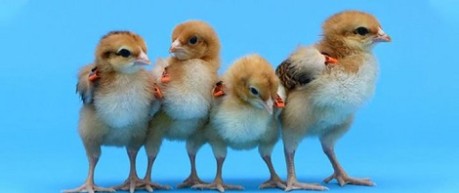Wednesday 2nd October 2019, 4:00pm
Infertile hens have been used to carry eggs containing other breeds, in a development using gene editing.

Hens that cannot produce their own chicks have successfully acted as surrogates for rare chicken breeds. The advance by a team led by The Roslin Institute could help to boost breeding of endangered birds and improve production of commercial hens.
Scientists used gene-editing techniques to inject specialised stem cells – called primordial germ cells – from another chicken breed into the eggs from the surrogate chickens. The adult hens then produced eggs containing all of the genetic information from the other chicken breed.
Researchers used a genetic tool they had previously developed, known as TALEN, to delete a section of chicken DNA.
The researchers targeted part of a gene called DDX4, which is crucial for bird fertility. Hens with the genetic modification were unable to produce eggs but were otherwise healthy, the team found.
DDX4 plays an essential role in the generation of primordial germ cells, which gives rise to eggs. The surrogate chickens were the first gene-edited birds to be produced in Europe.
Experts say the cells could potentially be used to help breed birds of other closely related species, as long as a supply of primordial germ cells is available from a donor bird.
The study, which involved scientists from poultry genetics company Cobb-Vantress, is published in the journal Proceedings of the National Academy of Sciences.
It was funded by the Biotechnology and Biological Sciences Research Council, Innovate UK, Horizon 2020 and Cobb-Vantress.
"New ideas are needed if we are to save many of our bird species. These chickens are a first step in saving and protecting rare poultry breeds from loss and preserving future biodiversity of our poultry from environmental and climate changes."